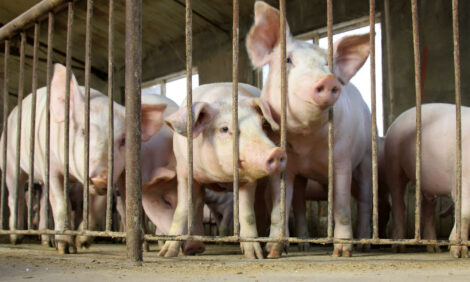



Canada Investigates Role of Feed in PED Virus Spread
CANADA - Investigations are underway after pig feed in southwest Ontario tested positive for the Porcine Epidemic Diarrhoea (PED) virus DNA.The Canadian Food Inspection Agency is exploring a possible link between pig feed and the deadly virus that has killed millions of piglets in the United States and spread to 11 farms in Ontario, reports The Globe and Mail.
Samples of pig food taken from some of the stricken farms in Southwestern Ontario tested positive for DNA of the virus on the weekend, prompting a recall from the manufacturer of the feed made with plasma from pig blood.
CFIA, which approves animal-food ingredients, is testing the feed on pigs to see whether they develop the virus, known as PED, which dehydrates and kills piglets and weakens older pigs.
Amy Cronin, chair of producer group Ontario Pork, said farmers should switch to feeds that do not contain pig products. “It is not worth the risk,” said Ms Cronin, a pig farmer in Ontario’s Huron County.
Greg Douglas, chief veterinarian for Ontario, said it is too soon to say the disease is being contracted at the trough. Faeces-to-mouth contact has been the traditional way PED has spread, and governments and industry in the US and Canada have led extensive campaigns to emphasise the importance of cleaning and drying trucks, and ensuring no manure is tracked into barns.
“I wouldn’t condemn feed and I wouldn’t exonerate it,” Dr Douglas said in an interview.
“From a biosecurity standpoint, feed has always been something that producers should be cognizant of, where it’s coming from and what the ingredients are. They should ask those questions,” he said.
Grand Valley Fortifiers, a Cambridge, Ontario, company that makes the feed containing pig blood byproducts, has recalled three of its products. The company did not respond to a request for an interview by The Globe and Mail.
The plasma is extracted from pig blood collected at abattoirs and added to the feed to boost protein levels and encourage growth in piglets.
Steve Dritz, a veterinarian and pig health specialist at Kansas State University, said a few similar cases are being investigated in the United States but no scientific proof of the feed-virus connection has been established.
Since being found in the US last spring, PED has spread to at least 23 US states, adds The Globe and Mail report. Eleven farms and three processing plants and yards are infected in Ontario, as well as one Quebec slaughterhouse.
The virus does not affect humans nor their food. The virus has been in Asia and Europe for years, but its arrival in North America threatens to devastate the pork industry. The pigs that do not die eventually build an immune system to the virus, and pass this resistance on to their young.







